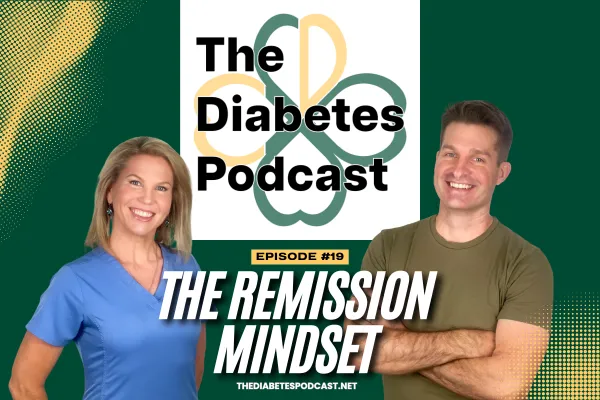
EP019 - The Remission Mindset and Type 2 Diabetes
The Remission Mindset: Five Truths to Put Diabetes 2 Into Remission
“There’s no acceptable amount of cancer—and there’s no acceptable amount of type 2 diabetes.”
If you’ve been stuck “managing” your type 2 diabetes while your meds, numbers, and worries climb, this is your wake-up call. Remission is possible. Not by luck. Not by a magic pill. By a mindset shift and focused action.
On this episode of The Diabetes Podcast, we shared five truths that move you from coping to conquering. These truths are bold. They might feel uncomfortable. But they can change your life.
Truth 1: You are responsible for your health
This starts and ends with you. Most primary care providers see thousands of patients and get minutes per visit. That’s why you hear generic advice like “eat better and exercise.” It’s not enough.
You don’t need shame or blame. You need leadership—your own. Treat your health like a business you run. If your daily habits are your performance report, would the board give you a bonus or fire you? You have the power to change your risk and your results.
Why this matters:
Type 2 diabetes is progressive if you let it be.
It raises your risk of heart attack and stroke 4–5x.
One in two U.S. adults has prediabetes or type 2 diabetes (many undiagnosed).
If you don’t know what to do, get educated and get help—fast. Waiting makes it harder.
Truth 2: “Managing” diabetes keeps you stuck
Managing diabetes sounds calm. It’s not. Management means, “I’ll live with this disease.” Remission says, “I’m done feeding it.”
Think of a sinking boat. You can bail water all day (more meds), or you can patch the hole (change what fuels the disease). There’s no “acceptable amount of cancer.” We treat cancer aggressively. Why do we accept living with type 2 diabetes?
When you stop fueling the disease—through targeted nutrition, sleep, movement, and habits—diabetes loses its power. Starve it. It withers. That is remission.
Truth 3: Type 2 diabetes IS that bad
We love hope and optimism. But we must be honest. The worst of diabetes is devastating—and often preventable.
Real numbers:
#1 cause of non-accidental amputations is diabetes; neuropathy is often present first.
1 in 4 people with diabetes will develop chronic kidney disease.
Diabetic retinopathy is a leading cause of adult-onset blindness.
Men with diabetes often develop erectile dysfunction 10–15 years earlier; meds often don’t help.
Nearly 1 in 5 adolescents (12–18) and 1 in 4 young adults (19–34) have prediabetes.
48–64% of lifetime diabetes medical costs are from complications like heart disease and stroke.
The scary part? It can feel fine until it isn’t. You can feel “normal” while damage builds. Then life changes fast: vision loss, dialysis, stroke, amputation. Many people say, “No one told me this.” We’re telling you now—so you can act now.
Truth 4: Diabetes is expensive—money, time, energy, life
The U.S. spends about $413 billion per year on diabetes. It’s our most expensive chronic disease.
Individuals with diabetes pay about $4,800 more per year out of pocket—before ER or hospital visits.
Common ER visits: low blood sugar (often from insulin mismatch) and severe high blood sugar.
The last years of life are often the most costly and the least enjoyable when diabetes advances.
But there’s another cost: missed moments. Skipping family events out of shame or fear. Canceling trips because of energy crashes. Worry after every meal. This steals joy.
Truth 5: You need help (and that’s a strength)
Admitting “I need help” is powerful. Going it alone is slow and risky. The right support compresses time, clarifies steps, and helps you avoid common traps.
What effective care can do (even before full remission):
Good blood sugar management can cut the risk of eye, kidney, and nerve disease by ~40%.
Better blood pressure lowers heart and stroke risk by 33–50%.
Improved cholesterol lowers cardiovascular risk by 20–50%.
Annual dilated eye exams with timely treatment can prevent up to 90% of diabetes-related blindness.
Regular foot exams plus education can prevent up to 85% of amputations.
Lower blood pressure reduces kidney decline by 33–37%.
Now imagine stacking smart management with a remission plan. Faster, deeper wins.
Why remission often fails without help
It’s not just “eat less sugar.” It’s food strategy, timing, protein, fiber, and carb quality.
It’s sleep, stress, and hormones (dawn phenomenon, liver glucose releases).
It’s insulin patterns (basal vs mealtime), and avoiding dangerous lows.
It’s habits, environment, emotions, and social norms that push you off course.
There’s a lot to navigate. A skilled team makes it clear, doable, and sustainable.
What about meds like GLP-1s?
Tools can help. But tools without strategy keep you in “management.” We teach you how to use any tool wisely while building the habits that move you to remission.
A quick note on type 1 diabetes
We’re talking about type 2 diabetes remission. Type 1 is an autoimmune disease and different. We work with and care deeply about people with type 1, but remission as described here applies to type 2.
How remission actually happens
Stop fueling the disease: Targeted nutrition to lower glucose and insulin demand.
Sleep like it matters: Better sleep improves insulin sensitivity and appetite control.
Move daily: Simple, consistent movement drives big changes over time.
Fix the inputs: Fewer ultra-processed foods; more protein, fiber, and real food.
Build guardrails: Plans for travel, holidays, stress, and social eating.
Get feedback: Labs, CGM when appropriate, and clear milestones.
Get coaching: Mindset, accountability, and troubleshooting.
Real talk on timeframes
You won’t “teleport” to remission. There’s no magic pill.
Most people feel better in weeks, see measurable progress in 1–3 months, and continue compounding gains from there.
Five years from now, you can be a different person. People overestimate one year and underestimate five. Start now.
Your next step: a simple reflection exercise
If you knew you could not fail, where do you want your health to be in five years?
Would yesterday’s habits get you there? If yes, keep going and raise the bar. If no or unsure, get reliable help.
Practical must-do’s this month
Schedule your annual dilated eye exam.
Get a foot exam and learn basic foot care.
Check blood pressure regularly and aim for improvement.
Review meds with your provider—know what each one does and why.
Start a protein-first plate at each meal and cut ultra-processed snacks in half.
Walk after meals (even 10 minutes helps).
Set a sleep window and stick to it 5 nights a week.
You’re not alone
Remission is possible. It’s been done. It’s being done. But you don’t have to do it alone. If you’re ready for clarity, accountability, and a proven path, we can help.
If you need help getting started, reach out to us at [email protected].
Final word
Don’t trade another day of your health for comfort. Take the first step now. Be brave. You can do this—and we can help.
Disclaimer
The information in this blog post and podcast is for educational and informational purposes only. It is not medical advice, diagnosis, or treatment, and it does not replace a one-on-one relationship with your physician or qualified healthcare professional. Always talk with your doctor, pharmacist, or care team before starting, stopping, or changing any medication, supplement, exercise plan, or nutrition plan—especially if you have diabetes, prediabetes, heart, liver, or kidney conditions, or take prescription drugs like metformin or insulin.
Results vary from person to person. Examples, statistics, or studies are shared to educate, not to promise outcomes. Any discussion of medications, dosing, or side effects is general in nature and may not be appropriate for your specific situation. Do not ignore professional medical advice or delay seeking it because of something you read or heard here. If you think you are experiencing an emergency or severe side effects (such as persistent vomiting, severe diarrhea, signs of dehydration, allergic reaction, or symptoms of lactic acidosis), call your local emergency number or seek urgent care right away.
We strive for accuracy, but health information changes over time. We make no guarantees regarding completeness, timeliness, or suitability of the content and assume no liability for actions taken or not taken based on this material. Use of this content is at your own risk.
Links or references to third-party resources are provided for convenience and do not constitute endorsement. By reading, listening, or using this information, you agree to these terms and understand that you are responsible for your own health decisions in partnership with your licensed healthcare provider.

